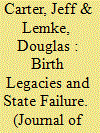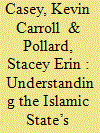| Srl | Item |
| 1 |
ID:
188826


|
|
|
|
|
| Summary/Abstract |
We argue patterns of state failure are influenced by variation in how states emerged as independent political actors. In particular, states with positive birth legacies, those whose emergence required relatively high levels of capacity and legitimacy, should be less likely to experience state failure than countries that experienced less auspicious births. We assess this claim on the universe of states in the international system between 1950 and 2002 with multistate duration models that estimate the probabilities states transition into and out of periods of failure. We find that states with positive birth legacies are less likely to experience state failure and that this relationship is driven by states with positive birth legacies being able to more quickly transition from failure back to being functioning states. Our findings offer evidence that state failure is usefully thought of in the context of state-making processes and show that how states emerge as independent actors influences phenomena central to comparative and international politics.
|
|
|
|
|
|
|
|
|
|
|
|
|
|
|
|
| 2 |
ID:
156915


|
|
|
|
|
| Summary/Abstract |
While many researchers have examined the evolution and unique characteristics of the Islamic State (IS), taking an IS-centric approach has yet to illuminate the factors allowing for its establishment in the first place. To provide a clearer explanation for IS’s successes and improve analysts’ ability to predict future occurrences of similar phenomena, we analyze IS’s competitive advantages through the lens of two defining structural conditions in the Middle East North Africa (MENA): failure of state institutions and nationhood. It is commonly understood that the MENA faces challenges associated with state fragility, but our examination of state and national resiliency shows that Syria and Iraq yield the most deleterious results in the breakdown of the nation, suggesting that the combined failure of state and nation, as well as IS’s ability to fill these related vacuities, is a significant reason IS thrives there today. Against this backdrop, we provide a model of IS’s state- and nation-making project, and illustrate IS’s clear competitive advantages over all other state and non-state actors in both countries, except for Kurdish groupings. We conclude with recommendations on how policy-makers may begin halting and reversing the failure of both state and nation in Iraq and Syria.
|
|
|
|
|
|
|
|
|
|
|
|
|
|
|
|